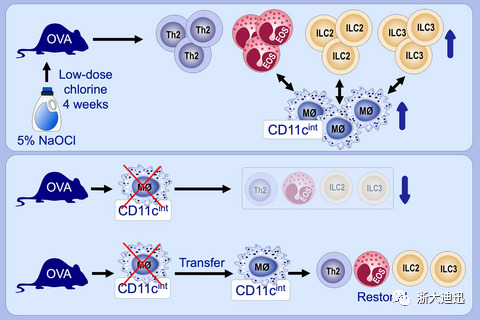Release date:2020-05-22

Allergy
[IF:6.048]
Aggravation of asthmatic inflammation by chlorine exposure via innate lymphoid cells and CD11cintermediate macrophagesDOI: 10.1111/all.14017
Abstract:
Background: Chlorine is widely used in daily life as disinfectant. However, chronic exposure to chlorine products aggravates allergic TH2 inflammation and airway hyperresponsiveness (AHR). Innate lymphoid cells (ILCs) in airways contribute to the inception of asthma in association with virus infection, pollution, and excess of nutrient, but it is not known whether chronic chlorine exposure can activate innate immune cells. The aim of this study was to evaluate the impact of chlorine inhalation on the innate immunity such as ILCs and macrophages in relation with the development of asthma by using murine ovalbumin (OVA) sensitization/challenge model.
Methods: Six‐week‐old female BALB/c mice were sensitized and challenged with OVA in the presence and absence of chronic low‐dose chlorine exposure by inhalation of naturally vaporized gas of 5% sodium hypochlorite solution. AHR, airway inflammatory cells, from BALF and the population of ILCs and macrophages in the lung were evaluated.
Results: The mice exposed to chlorine with OVA (Cl + OVA group) showed enhanced AHR and eosinophilic inflammation compared to OVA‐treated mice (OVA group). The population of TH2 cells, ILC2s, and ILC3s increased in Cl + OVA group compared with OVA group. CD11cint macrophages also remarkably increased in Cl + OVA group compared with OVA group. The deletion of macrophages by clodronate resulted in reduction of ILC2s and ILC3s population which was restored by adoptive transfer of CD11cint macrophages.
Conclusion: Chronic chlorine inhalation contributes to the exacerbation of airway inflammation in asthmatic airway by mobilizing pro‐inflammatory macrophage into the lung as well as stimulating group 2 and 3 ILCs.
First Author:
Ji‐Su Shim
Correspondence:
Hye Young Kim, Laboratory of mucosal immunology, Department of Biomedical Sciences, Seoul National University College of Medicine, 103 Daehak‐ro, Jongno‐gu, Seoul 03080, Korea.
All Authors:
Ji‐Su Shim, Hyun‐Seung Lee, Da‐Eun Park, Ji Won Lee, Boram Bae, Yuna Chang, Jihyun Kim, Hye Young Kim, Hye‐Ryun Kang
2020-02-17 Article
 江南游戏官网中国有限公司
江南游戏官网中国有限公司
